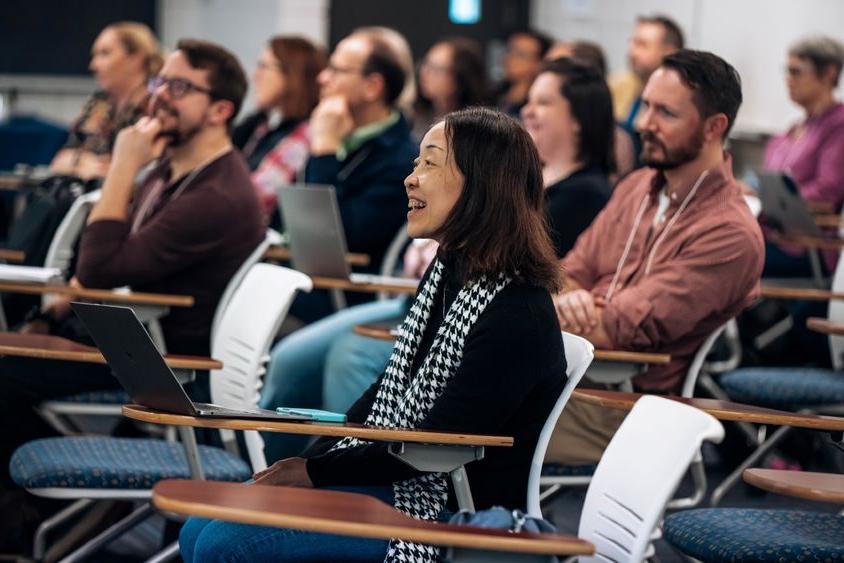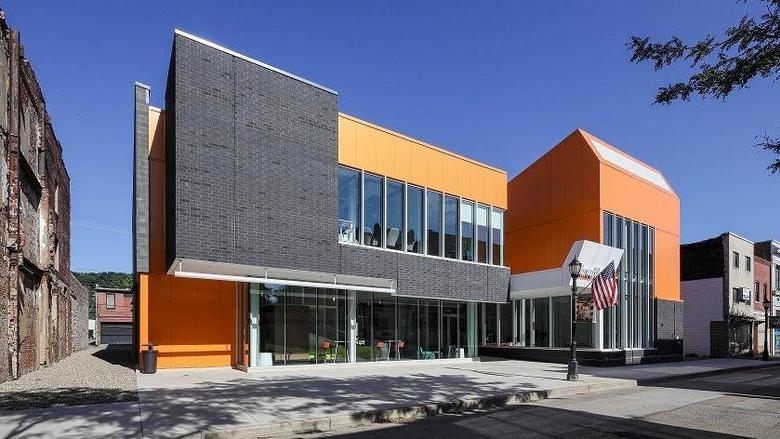
Faculty members from 20 colleges and universities in Southwestern Pennsylvania attended the Future Readiness Workshop at Penn State New Kensington at the end of January 2024. Attendees learned about the challenges and opportunities provided by artificial intelligence (AI) in relation to higher education. The effort was led by Penn State New Kensington and is a project of the Southwestern Pennsylvania New Economy Collaborative (SWPANEC), one of 21 federal Build Back Better Regional Challenge (BBBRC) grant awardees.
The event was a follow-up to last fall’s “Education Vanguard: Building the Education of the Future Together" Conference that was also led by the New Kensington campus and held in October 2023 as part of the SWPANEC. It was also the first of a series of events to happen in 2024, which will also include: the Faculty Future Readiness Academy (May 15-17), a second Future Readiness Workshop (Aug. 9) and the second-annual Education Vanguard Conference November 14-16.
NEW KENSINGTON, Pa. — Higher education faculty members from 20 Southwestern Pennsylvania colleges and universities attended the Future Readiness Workshop at the end of January at Penn State New Kensington. The one-day workshop focused on the topic of artificial intelligence (AI) and the challenges and opportunities it provides to educators and students. The effort was led by Penn State New Kensington and is a project of the Southwestern Pennsylvania New Economy Collaborative (SWPANEC), one of 21 federal Build Back Better Regional Challenge (BBBRC) grant awardees.
The event featured a keynote presentation by Jeffrey Cole, director of the Center for the Digital Future and research professor of communication at USC Annenberg. Using case studies, Cole outlined ways to recognize disruption caused by AI and ways to take action. He also provided an overview of the technological landscape in 2024 so that faculty members could learn about threats and opportunities posed by it.
“Artificial intelligence is on the verge of becoming the most disruptive change of all time; everything and everyone will be affected,” said Cole. “I hope faculty and administrators came away from the talk understanding past mistakes leaders have made in dealing with disruptive risks and how they can be ready for anything that comes and even make to work to their advantage.”
In addition to Cole’s presentation, the more than 70 regional, collegiate academic attendees were able to choose to attend one of two breakout sessions. Camille Dempsey, associate professor of middle and secondary education and coordinator of the master of education advanced study program in educational technology and online teaching at Pennsylvania West University, led a workshop on the evolution of AI in higher education and a discussion on sharing ideas for fields in humanities to leverage tools and strategies. Jay Burns, associate professor and director of the master's in science for IT management program and chair of the Department of Technology, Analytics and Mathematics at Seton HIll University, hosted a session that explored the impact of AI in STEM-related disciplines and discussion about ideas for implementing AI projects with students.
The Future Readiness Workshop was a follow-up to last fall’s “Education Vanguard: Building the Education of the Future Together" Conference that was also led by the New Kensington campus and held in October 2023 as part of the SWPANEC. It was also the first of a series of events to happen in 2024, which will also include: the Faculty Future Readiness Academy (May 15-17), a second Future Readiness Workshop (Aug. 9) and the second-annual Education Vanguard Conference November 14-16. Those interested in learning more can visit the Future Readiness Events for Faculty website or reach out to Shirley Campbell, instructional designer and future readiness events coordinator by email at [email protected]
About Penn State New Kensington
Penn State New Kensington is one of 24 campuses that comprise Penn State. Located just 17 miles from the city of Pittsburgh, the campus is nestled on 72 wooded acres of Upper Burrell, Pennsylvania, and is easily accessible from almost anywhere in Allegheny, Armstrong, Butler, Indiana and Westmoreland counties. Penn State New Kensington offers 11 baccalaureate and four associate degrees, as well as the first two years of almost all of Penn State’s 275+ majors through the University’s 2+2 plan. The campus continues to fulfill the University’s land-grant mission through its ongoing efforts in the city of New Kensington to drive economic development and revitalization and to prepare the Rust Belt region for the next industrial revolution. This work includes its Invent Penn State innovation hub, The Corner, and its digital manufacturing innovation lab, the Digital Foundry at New Kensington.
About the Southwestern Pennsylvania New Economy Collaborative
The Southwestern Pennsylvania New Economy Collaborative is an 11-county coalition formed to apply for the Build Back Better Regional Challenge (BBBRC). The collaborative includes 90+ organizations: community-based organizations, labor unions, educational and research institutions, economic development partners and leaders from the private, public and philanthropic sectors. BBBRC is the marquee program of the U.S. Economic Development Administration’s American Rescue Plan to boost economic recovery from the pandemic and rebuild American communities.





